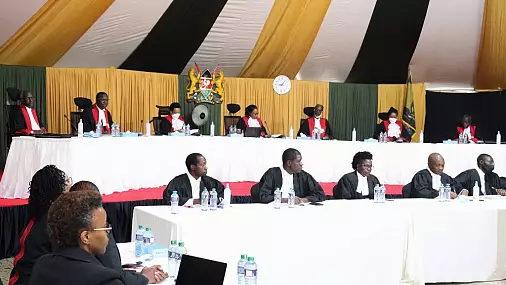Kenya’s democratic experiment put to extra test
Kenya’s Supreme Court, renowned for its independence, is once again being invited to rule on a presidential election dispute, after the door of the bench was officially knocked on Monday by opposition leader Raila Odinga’s camp, furnishing the arbiter with particulars to make determination.
Whereas the legal team of the petitioner Raila Odinga has the duty to discharge the burden of proof, those of President-Elect Dr. William Ruto and IEBC will have the task in convincing the bench to decline the invitation to uphold reliefs the petitioner is seeking before the court.
Kenya’s apex court, which annulled the last presidential election in 2017, must now rule within 14 days.
Raila Odinga, a historic opposition figure backed this year by incumbent President Uhuru Kenyatta, has described the results of the August 9 election as a “travesty”, with incumbent Vice President William Ruto winning by about 233,000 votes.
“The Supreme Court is the “final arbiter and interpreter of the Constitution”, as a result of the 2010 Constitution, which is considered one of the most progressive in Africa.
Kenya’s Independent Electoral and Boundaries Commissionl Chairman has declared Deputy President William Ruto the winner of the close presidential election over five-time contender Raila Odinga.
Its decisions are final and binding, handed down by seven judges officially appointed by the President of the Republic but whom the latter does not have the power to choose.
The names of the candidates are submitted to the Presidency by the judiciary, following a process of open application and selection through public hearings – sometimes broadcast on television.
The Supreme Court was established to rule on decisions of the courts of appeal on law or interpretation of the constitution and is the only court allowed to decide disputes related to the presidential election.
“The judiciary in Kenya has repeatedly asserted its independence from the executive,” the Carnegie Endowment for World Peace said in a report in July.
The Supreme Court is the highest court in the Kenyan judicial system, which “is one of the strongest in the region and will not bow to political pressure,” said Benjamin Hunter, an Analyst at the British firm Verisk Maplecroft.
The court has a high level of credibility and a judicial process would act as a valve to defuse political tensions,” he said.
The 2017 presidential election was invalidated In the August 2017 presidential election, Uhuru Kenyatta was declared the winner with 54% of the vote, against 45% for the then historical opponent, Raila Odinga.
Raila Odinga appealed to the Supreme Court, alleging that the Independent Electoral Commission (IEBC) database had been hacked and the results falsified.
Supreme Court invalidated the election due to “irregularities” and ordered a new election to be held within two months, a first in Africa.
This historic decision was welcomed abroad as a pledge of independence for the judiciary but castigated by Kenyatta who railed against the “crooked” judges.
In October, he was finally elected with 98% of the vote in a ballot boycotted by the opposition and marked by a low turnout.
Four years earlier, the Supreme Court had rejected an appeal filed by Odinga, confirming Uhuru Kenyatta’s election for his first term.
In March 2022, the Kenyan Supreme Court confirmed its independence by invalidating a constitutional review process initiated by Uhuru Kenyatta.
This project called “Building Bridges Initiative” (BBI) intended to create new positions within the executive, including a Prime Minister, in order to mitigate the current system of “winner takes all”, causing according to the president recurrent electoral conflicts.
His critics denounced a ploy by the head of state, who is constitutionally barred from running for a third term, to keep himself in power.
In their respective presentations, six of the seven magistrates considered that the president did not have the right to initiate this revision process.
Since May 2021, the Supreme Court has been chaired by Chief Justice Martha Koome, the first woman in the country’s history to head one of the three branches of government.
The 62-year-old former lawyer and women’s rights activist was considered an unlikely candidate among the ten contenders for the post.
Martha Koome made a name for herself during the regime of the autocrat Daniel arap Moi (1978-2002), when she defended political prisoners, including Raila Odinga.
Educated at the University of London, she joined the judiciary in 2003, after practising as a lawyer for over a decade.
In 2019, she was part of a five-judge panel that rejected an appeal to stop an organisation from advocating for gay rights.
She has vowed to rid the judiciary of corruption and preserve its independence.





















































